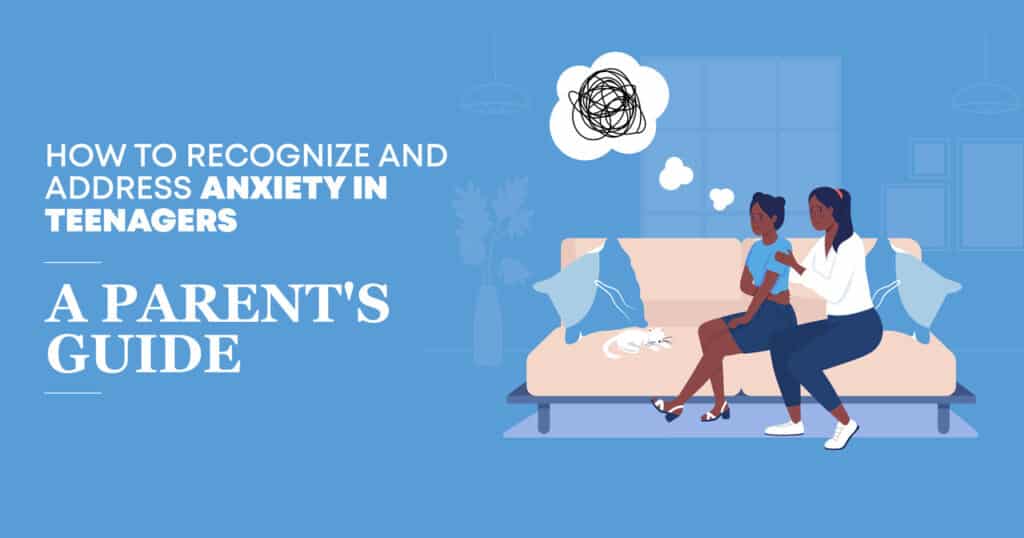Understanding and addressing anxiety in teenagers is one of the most important tasks a parent can undertake. Adolescence is a challenging time filled with change, and stress can often creep in, leaving teens feeling overwhelmed and parents unsure of how to help.
Essential Takeaways
- Recognize the Signs: Be aware of anxiety symptoms, including emotional, physical, and behavioral signs. Early recognition can lead to timely intervention and support.
- Foster Open Communication: Create a supportive environment for your teen to express their feelings. Use open-ended questions and active listening to facilitate dialogue.
- Encourage Healthy Coping Mechanisms: Support your teen in developing effective coping strategies, such as mindfulness, physical activity, and healthy lifestyle choices. Professional help may also be necessary for persistent or severe anxiety.
This guide will provide you with the knowledge and tools to recognize the signs of anxiety in your teenager and support them in navigating this complex emotion.
Understanding Teen Anxiety
Anxiety in teens often stems from a variety of sources, including academic performance, social expectations, family dynamics, and even the challenges of figuring out who they are. While some everyday worry is normal, particularly in response to stressful events, anxiety becomes problematic when it interferes with everyday life and well-being.
Common Signs and Symptoms of Anxiety in Teens
Recognizing anxiety symptoms in your teenager can be challenging. Teens may not always communicate their feelings directly, so parents must remain vigilant to changes in behavior, emotions, and physical health.
Emotional Symptoms
Emotional symptoms of anxiety in teens may include persistent excessive anxiety, fear, or feelings of intense pressure. Your teen might express dread or irrational fear in social situations. Separation anxiety or social anxiety could also develop, affecting social interactions and making everyday tasks feel daunting.
Physical Symptoms
Anxiety affects the body, manifesting in physical symptoms such as a rapid heartbeat, shortness of breath, and even fatigue. Teens experiencing panic attacks may describe feeling as if they’re having a heart attack, with extreme anxiety causing distress.
Behavioral Symptoms
Teens with anxiety might avoid activities they once enjoyed, such as sports or social activities. You may notice a drop in grades or school refusal due to excessive worry about academic performance. Some teens also isolate themselves, withdrawing from family and friends, which can worsen mental health challenges.
Differentiating Normal Stress from Anxiety
Understanding everyday stress versus anxiety disorders is essential, as not all stress is harmful. Anxiety in adolescents can emerge in response to challenging situations but becomes a concern when it begins to impact daily routines and quality of life.
When Does Stress Become Anxiety?
Stress becomes chronic anxiety when it persists without a clear cause. If your teen constantly feels anxious about normal activities, it could indicate a more serious issue. Teens suffering from acute anxiety may experience frequent episodes of panic attacks or ongoing social anxiety.
Common Causes of Anxiety in Teenagers
Academic Pressure
The intense drive to succeed academically is a significant cause of anxiety in teens. They may feel a constant need to perform well in class presentations, sports, and other extracurricular activities, leading to a fear of failure.
Social Media and Peer Pressure
Constant exposure to social media can trigger anxiety. The pressure to present a perfect image online often causes extreme self-consciousness, negatively affecting mental health.
Family Dynamics
Family expectations and dynamics play a crucial role in the development of anxiety disorders. Family therapy might be necessary to address issues arising from anxiety-inducing interactions.
Building Open Communication
One of the most effective ways to address teen anxiety is by fostering open communication. Encouraging your teen to express their anxious feelings in a safe space is essential for managing anxiety disorders. Behavioral therapy and family therapy can offer support in more severe cases.
Recognizing When to Seek Help
If your teen’s mental health concerns persist, seeking a mental health professional may be necessary. Cognitive-Behavioral Therapy (CBT), behavioral therapy, and, in some cases, anti-anxiety medications or antidepressant medications might be recommended.
Practical Strategies for Managing Anxiety
Encouraging your teen to develop coping mechanisms is key. Strategies like physical activity, mindfulness, and therapy can significantly improve their daily functioning.
FAQs
How can I tell if my teen’s anxiety is normal or requires professional help?
Normal anxiety is typically situational and temporary. If anxiety persists, worsens, or significantly impacts daily functioning, it’s a good idea to seek professional help.
What are some practical ways to communicate with a teenager about their anxiety?
Approach conversations with empathy and openness. Use open-ended questions and listen actively without judgment or immediate solutions.
How can social media contribute to my teen’s anxiety?
Social media can lead to comparison with unrealistic standards, FOMO, and pressure to maintain a perfect image, all of which can exacerbate anxiety.
What should I do if my teen refuses to talk about their anxiety?
Respect their privacy while reassuring them that you can listen whenever they’re ready. Encourage gradual sharing and suggest professional help if needed.
Are there any specific therapies or treatments for teenage anxiety?
Therapies such as cognitive-behavioral therapy (CBT) and mindfulness-based approaches can be effective. Consulting a mental health professional can help determine the best treatment plan.




